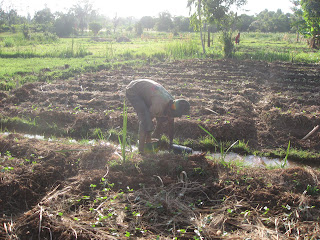The current dry season of the year persists on in the wider
region of East Afrika. This is a season especially meant for the ripening of
various crops that had been planted during the last rains. At the Shiriki
Organization farm in Maragua some of these crops include maize, soya,
groundnuts and sweet potatoes. Meanwhile,
cassava, yams, pumpkins, the Ethiopian beans, arrowroots, sugarcane are yet in
the field taking their time. However, the recently-planted beans and cowpeas
are doing very well under irrigation.
Recently, we harvested organic manure from our compost and
immediately started preparing another lot which will take 21 days before it is
ready for harvesting. This batch of compost has been set with the help of tips
provided by Mr. Murage of The Organic Farmer
Magazine who had given us a visit a couple of days ago.
 |
| L-R: Ras Ng'ang'a, Mr. Murage of TOF, Ras Muiruri. |
According to Mr. Murage’s counsel, we dug the pit 4 meters
deep by 4 meters wide and 4 meters breadth. The organic farming expert, whose
organization mainly focuses on disseminating knowledge on organic farming, also
issued us with tips of making nursery beds on top of the soil dug out when
excavating a new compost pit.
Pertaining Conservation Agriculture, Mr. Murage said this
can only be implemented at a later stage of land development. The expert shall
come back mid February to supervise the progress, share more of his knowledge
and as usual learn from the farmers’ experience on the ground.
Meanwhile, we have sowed additional varieties of crops in our nurseries. These include a selection of Ethiopian crops. Those that have been confirmed to have germinated include Tef, Lentils, Shiro beans, Barley as well as Foul Sudanese beans. Other new nurseries carry Cauliflower, Coriander and Spinach.
Meanwhile, we have sowed additional varieties of crops in our nurseries. These include a selection of Ethiopian crops. Those that have been confirmed to have germinated include Tef, Lentils, Shiro beans, Barley as well as Foul Sudanese beans. Other new nurseries carry Cauliflower, Coriander and Spinach.
 |
| Farmers sowing seeds in a nursery bed. |
In general, local farmers around Maragua have neglected vegetable
farming even for sustenance and opted for the more commercial crops such as
French beans and genetically modified bananas. Thus, we have taken upon
ourselves to re-introduce indigenous vegetables in this community. Gathering
indigenous seeds is such a crucial task for agriculture as an occupation cannot
endure without the natural seeds that the Almighty in His highest wisemind
created. So far, we have managed to obtain
and plant an indigenous breed of Sukuma
wiki [kales] that come from Ethiopian too.
The site of our farm makes it indeed the ‘Promised land’
where water flows all the year round. Towards the west of the farm is the
lowland that is partitioned by canals of water and the land here lies virgin.
The first and ongoing task is revitalizing the canals which had remained
unmaintained for long. The mud mounds forming the banks after unclogging the
canal are best for sugarcane growing. Volunteers stationed in Nairobi have been
coordinating with the young farmers on the ground sending loads of sugarcane
cuttings for planting.
As pertaining to these lowlands, we envision planting early long before the rain so that by the time it falls the crops will have grown to a height that they can withstand floods which are common in such low-lying areas. This gives us a clear picture of how much strength of the youth is needed to make the land productive and capable of sustaining the community.
 |
| Beds containing a variety of Ethiopian seeds. |
Meanwhile, more volunteer youth who have a keen interest in
the activities going on in Maragua have continued supporting in one way or
another. A week ago, the young farmers were pleased to receive me (Ras Benaiah),
Sista Eden and Ras Gabriel from Nairobi. The visitors graced the works of the
farmers with seeds – Coriander, Spinach, Cauliflower, Peaches, indigenous
Pumpkin and Dates – and also gave encouragement in the endeavors manifested by
the volunteers.
 |
| Sis Eden & Ras Benaiah |

It was a great moment for me as the blog animator/editor to witness for the first time the works on the ground. The confidence in the farmers added to mine in making the world aware of the sacred works going on in Maragua.
I would wish to practice my profession of media while close to these farmers to allow for dissemination of fresh information worldwide. But until the necessary infrastructure and technology is put in place right on at Maragua then it would be difficult to realize such a vision of serving the community.
Thus, to open the opportunity for youth in different professions to take their service down to the community,
we have come to realize the need of putting up a well-equipped complex that has the
capability of housing young people practicing various professions. Some of the
activities we envision and already have skilled volunteers in include;
·
Community Radio station & Studio – video and
audio production
·
Art workshop & gallery – for shoe industry,
painting, mosaic, beadwork, weaving
·
Music school
·
Bakeries, mills and other food processing &
packaging facilities
·
Tailoring
·
Research facilities – Internet, books, audio
& visual
·
Social hall
To us, this is an ideal way in which skilled and knowledgeable
people can come close to the community and serve it.
However, for us to achieve this noble idea we need the
collective efforts of all well-wishers and lovers of humanity. Let’s all shiriki in this noble task of
emancipating our people.

No comments:
Post a Comment